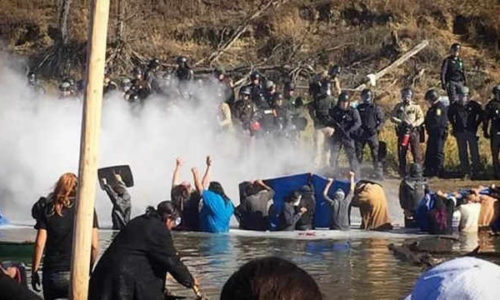Native Americans in Montana expressed anger, hurt and betrayal toward Governor Steve Bullock shortly after his reelection became official, for sending Montana law enforcement to protests in North Dakota.
The Governor’s decision is based on a national interstate agreement called Emergency Management Assistance Compact (EMAC), which allows states to help other state governors for assistance.
Attorney General Tim Fox stated Thursday afternoon that on October 29th, he sent 10 Montana Highway Patrolmen to North Dakota to assist a unified command of other sheriff’s deputies and North Dakota state police.
Meanwhile, anger toward Bullock came quickly from his Native American constituents.
Posts began circulating around Wednesday morning on social media with #notmygovernor and #notfornativepeople trending, with many saying they felt betrayed by Bullock after overwhelming votes came in for him from tribal counties on election day.
“It’s not just a native problem, it’s our problem, its a U.S. problem, that we have to understand how to transition,” said Dustin Monroe, CEO for Native Generational Change, on the Dakota pipeline controversy. “We have to understand that water is life.”
Monroe said that just before election day, a friend of his told him Bullock had approved the sending of troops to Standing Rock.
“And I was like ‘Are you sure he would do that? It’s the day before the election.’ He was just in Browning, Montana at the reservations, talking about sovereignty and how he was going to protect our rights and help us move forward.”
Representatives for the Governor gave ABC Fox Montana a statement Wednesday afternoon, saying “My thoughts are with the thousands of people, including Montanans, gathered around Standing Rock in North Dakota. Working government to government, we look forward to a quick and peaceful resolution.”
Bullock also pointed out that the patrolmen are currently scheduled to return on Sunday, but Monroe said there’s still a very high number of tribal people whose opinions of Bullock may now be damaged.
“I’d say it’s about 50-50,” he said. “For some tribal members he burned the bridge. In the next 4 years he can mend those bridges, in actually setting this right and understanding and talking with us, and not trying to talk to us but with us.”
Bullock’s representatives also pointed out that this request was approved by the State early in October, and since conditions on the ground have changed, Bullock has committed to tribal leaders that he will consult with them on future requests.
Robert McDonald of the Confederated Salish Kootenai tribes also weight in, stating that there is a clear distinction between the sentiment of tribal individuals and the tribal council.
Thursday morning, McDonald said that the tribal council has demonstrated a history of supporting Bullock in the past, but they’ve been out of session this week, and he doesn’t know if the subject will be discussed once they convene next time.

